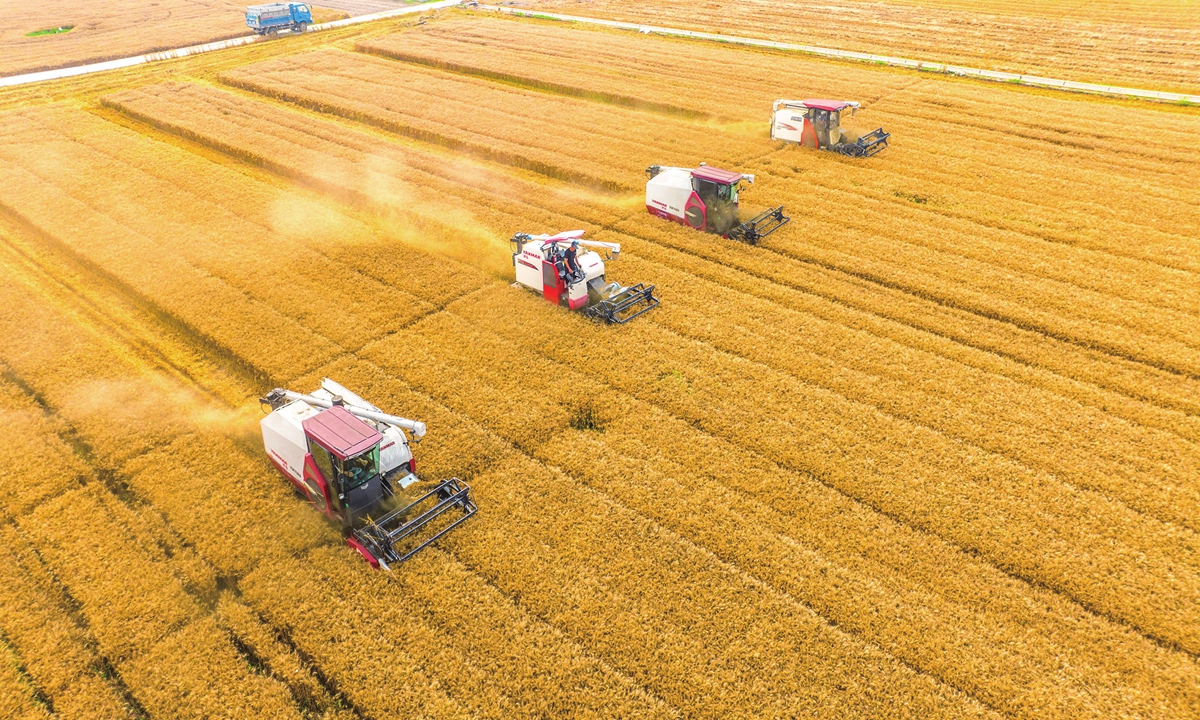
Farmers drive machines to harvest wheat in Hai’an city, East China’s Jiangsu Province on June 7, 2023. As a total of 550,000 mu (36,666.7 hectares) of wheat in the city enters the harvest season, local farmers work day and night to ensure that the crops can be collected quickly. Photo: IC
The draft of the Food Safety Law was submitted for review at the 3rd session of the 14th National People's Congress Standing Committee on Monday, representing China's dedicated efforts to ensure food security, with the aim of enhancing the capacity to prevent and counter risks related to food safety. It is also the first time that this draft has been submitted for review at a meeting of the National People's Congress Standing Committee.
The formulation of the Food Security Safeguard Law holds significant importance in addressing the current challenges faced by China, such as the small amount and low quality of arable land, increasing difficulty in maintaining and increasing grain production, and insufficient emergency support, thus serving as a crucial step in ensuring food security.
The draft has made comprehensive improvements in areas such as farmland protection, as well as the production, reservation, distribution, and processing of grain. The purpose of the draft's introduction is to effectively enhance the capacity to prevent and counter food security risks, ensure the efficient supply of grain, and provide legal guarantees for the modernization of governance capacity in food security.
The total grain production in the country has consistently exceeded 1.3 trillion kilograms for eight consecutive years. The grain availability stands at 500 kilograms per capita, which surpasses the food security red-line proposed by the Food and Agriculture Organization (FAO), according to data from the Ministry of Agriculture and Rural Affairs.
These achievements ensure basic self-sufficiency in cereals and absolute food security, demonstrating China's commitment to maintaining a stable and reliable food supply.
The meeting of the Standing Committee also emphasized that the current situation of food security in our country is favorable, with consecutive years of abundant harvests, sufficient grain reserves, and ample market supply.
Although China's food security showed better-than-expected figures, the country's huge amount of population, accelerating urbanization and pollution are eroding the country's arable land and threatening food security.
The data indicates that the soil pollution rate in the country's farmland has increased from less than 5 percent in the 1980s to 19.4 percent in 2014. At the same time, the excessive use of chemical substances such as fertilizers and pesticides has directly resulted in the imbalance and degradation of water resources and agricultural ecosystems, posing a threat to agricultural production and leading to a decline in food quality.
In addition, research has shown that 27 percent of grain in China is lost or wasted during the process from the farm to the table. Each year, more than 50 billion kilograms of food is wasted on dining tables, which is close to one-tenth of the national total production and is valued at a staggering 200 billion yuan.
These aforementioned issues will be addressed and regulated through the promulgation of the Food Safety Law. Additionally, the draft bill also stipulates corresponding legal responsibilities for related illegal activities and establishes links with laws and administrative regulations concerning land management, agricultural product quality and safety, food safety, anti-food waste, and safety production.
Global Times

